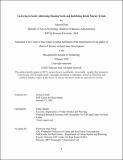Co-Living in Seoul: Addressing Housing Needs and Redefining Rental Market Trends
Author(s)
Park, Suhyeon
DownloadThesis PDF (758.5Kb)
Advisor
Duarte, Fabio
Terms of use
Metadata
Show full item recordAbstract
Co-living emerged as a novel asset class in the mid-2010s, addressing the housing needs of urban residents affected by rising housing costs, increasing urban migration, and the growing prevalence of single-person households. In South Korea, co-living has gained attention as a viable alternative to traditional housing, driven by unique local dynamics, including the decline of the dominant Jeonse system and a significant shortage of housing tailored to single-person households. With a growing preference for monthly rental systems over the Jeonse systems, both local conglomerates and start-ups have capitalized on the opportunity to offer company-operated co-living spaces. As the market grows, major international investors and global co-living providers have also entered, reflecting a unique market environment where institutionalized housing options are expanding alongside a notable shift in rental transaction systems. In this new era of urban housing, co-living is rapidly expanding and gaining popularity. This thesis seeks to answer the following question: What factors have driven the emergence and growth of the co-living market in Seoul, and what is its growth potential? To address this, it starts with an analysis of market drivers, provider strategies, and regulatory developments, followed by projections of market potential and an assessment of potential threats and mitigation strategies for long-term viability of co-living in Seoul. The goal is to offer insights for co-living providers to optimize their spaces and services. The findings suggest that while co-living addresses unmet housing demand, its long-term success depends on balancing operational efficiency with tenant satisfaction. While these strategies are applicable in other cities, they are particularly critical in Seoul, where the Jeonse system remains a strong and historically preferred alternative. In Seoul, co-living serves a dual mission: introducing an innovative housing model and reshaping the paradigm of the Wolse rental housing system. To succeed, co-living operators must clearly articulate their unique value proposition, addressing both the housing needs of urban residents and the broader evolution of the rental market.
Date issued
2025-02Department
Massachusetts Institute of Technology. Center for Real Estate. Program in Real Estate Development.Publisher
Massachusetts Institute of Technology